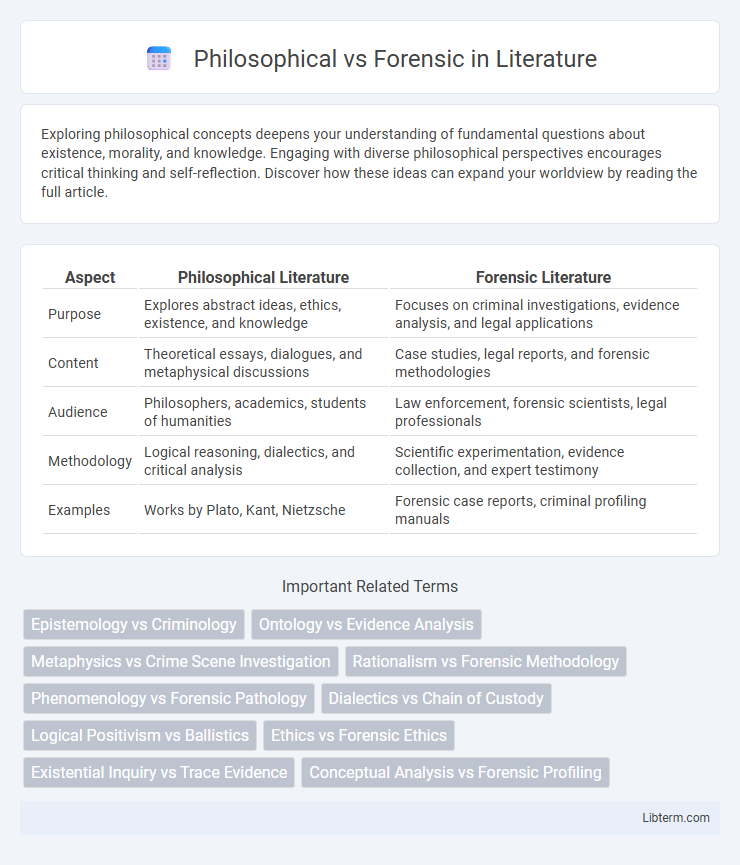Exploring philosophical concepts deepens your understanding of fundamental questions about existence, morality, and knowledge. Engaging with diverse philosophical perspectives encourages critical thinking and self-reflection. Discover how these ideas can expand your worldview by reading the full article.
Table of Comparison
| Aspect | Philosophical Literature | Forensic Literature |
|---|---|---|
| Purpose | Explores abstract ideas, ethics, existence, and knowledge | Focuses on criminal investigations, evidence analysis, and legal applications |
| Content | Theoretical essays, dialogues, and metaphysical discussions | Case studies, legal reports, and forensic methodologies |
| Audience | Philosophers, academics, students of humanities | Law enforcement, forensic scientists, legal professionals |
| Methodology | Logical reasoning, dialectics, and critical analysis | Scientific experimentation, evidence collection, and expert testimony |
| Examples | Works by Plato, Kant, Nietzsche | Forensic case reports, criminal profiling manuals |
Defining Philosophical and Forensic Approaches
Philosophical approaches emphasize critical thinking, abstract reasoning, and the exploration of fundamental concepts, often focusing on ethics, metaphysics, and epistemology. Forensic approaches prioritize the application of scientific methods and evidence analysis to investigate and resolve legal matters, relying on tangible data and empirical verification. Defining these approaches highlights philosophy's theoretical inquiry versus forensics' practical, evidence-based problem-solving.
Historical Origins and Development
Philosophical inquiry originated in ancient Greece with thinkers like Socrates, Plato, and Aristotle, emphasizing reason, ethics, and metaphysics to explore fundamental questions about existence and knowledge. Forensic science evolved from early forensic medicine and legal practices in the Roman Empire, gradually incorporating scientific methods to analyze evidence for criminal investigations. The historical development of philosophy shaped abstract theoretical frameworks, while forensic science advanced through empirical techniques focused on practical application in law enforcement and the justice system.
Core Principles and Methods
Philosophical analysis centers on logical reasoning, critical thinking, and ethical inquiry to explore fundamental truths and abstract concepts. Forensic investigation relies on empirical evidence, scientific methods, and procedural rigor to establish facts and support legal decision-making. Core principles in philosophy prioritize argumentation and theoretical frameworks, whereas forensic methods emphasize tangible proof and systematic examination.
Philosophical Inquiry: Purpose and Process
Philosophical inquiry centers on exploring fundamental questions about existence, knowledge, and ethics through critical thinking and reflective analysis. It employs logical reasoning and dialectical methods to examine abstract concepts and challenge assumptions, aiming to achieve deeper understanding rather than empirical proof. This purposeful process fosters open-ended dialogue that contrasts with the evidence-based, procedural approach of forensic investigation.
Forensic Analysis: Techniques and Applications
Forensic analysis employs scientific techniques such as DNA profiling, toxicology, and fingerprint examination to accurately identify evidence and solve crimes. Applications span criminal investigations, legal proceedings, and accident reconstruction, providing objective insights critical for justice. Advanced methods like digital forensics and trace evidence analysis enhance the precision and reliability of forensic outcomes.
Epistemology: Seeking Truth in Different Domains
Philosophical epistemology explores the nature, scope, and limits of knowledge, emphasizing abstract concepts like justification, belief, and truth across various contexts. Forensic epistemology applies these principles pragmatically to evaluate evidence, aiming to establish factual truth within legal investigations and trials. Both domains prioritize truth-seeking but differ in methods--philosophy uses critical analysis and argumentation, whereas forensics relies on empirical data, verification, and procedural standards.
Evidence and Reasoning: Contrasts and Comparisons
Philosophical reasoning relies on abstract concepts and logical consistency to evaluate evidence, often emphasizing theoretical frameworks and principles. Forensic reasoning prioritizes empirical evidence and factual verification, utilizing scientific methods and chain-of-custody protocols to ensure accuracy and admissibility in legal contexts. While philosophy critiques assumptions and explores possibilities, forensic analysis demands concrete proof and replicable results to establish guilt or innocence.
Intersections and Influences Between Fields
Philosophical and forensic disciplines intersect through the application of critical thinking and ethical reasoning in legal investigations and courtroom scenarios. Philosophical frameworks influence forensic methodologies by shaping the principles of evidence evaluation, truth-seeking, and justice interpretation. Advancements in forensic science often prompt philosophical debates on epistemology and moral responsibility, highlighting a dynamic interplay that enhances both theoretical understanding and practical implementation.
Case Studies: Real-World Philosophical and Forensic Scenarios
Case studies in philosophical contexts often explore ethical dilemmas and the theoretical underpinnings of justice, while forensic case studies emphasize the practical application of scientific methods to solve crimes. Real-world philosophical scenarios might analyze the morality of legal decisions, contrasting with forensic cases that provide tangible evidence for courtroom proceedings. These distinct approaches highlight the complementary nature of abstract reasoning and empirical investigation in understanding and administering justice.
Contemporary Relevance and Future Perspectives
Philosophical inquiry continues to shape ethical frameworks and critical thinking in contemporary society, influencing debates on artificial intelligence, bioethics, and human rights. Forensic science advances rapidly with innovations like digital forensics and AI-driven crime scene analysis, improving accuracy and efficiency in legal processes. Future perspectives highlight interdisciplinary collaboration, integrating philosophical ethics with forensic technology to address emerging challenges in law and societal justice.
Philosophical Infographic

 libterm.com
libterm.com